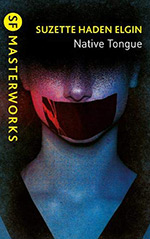
![]() mfennvt
mfennvt
10/25/2013
![]()
Suzette Haden Elgin published Native Tongue, the first book in this eponymous trilogy, in 1984. I was 22 in 1984.
I remember Reagan's election and how many of us on the left (I was already quite at home way over on the left wing) were frightened by the possibilities, many of which have come to pass. I also remember the beginnings of the backlash on feminism, a backlash that just keeps growing 30 years later. So, I get where Haden's coming from with her story of a dystopian future USA where women have lost all their rights and are now the property of men in worse ways then they were before the second wave of feminism. My 22 year-old self would have eaten this book up and looked for more.
I'm sad to report, however, that the book didn't really do much for my 51 year-old self. The story immediately irked me with the premise that the constitutional amendments revoking the 19th amendment and turning women into minors under the law would have happened by 1991. I mean, okay, Reagan and his ilk scared me, too, but 1991? That seems awfully premature.
That's always a risk writers take, putting events in the super-near future. I'm still miffed that 2001 came and it was nothing like the movie. There was a 33-year gap there. To predict something this cataclysmic happening less than 10 years from when you're publishing? Might have wanted to think that through a little more.
So, I had to try to push that aside as I read further. Fortunately the rest of the book takes place centuries in the future, the 22nd to be exact. There we discover that not only do women still not have any rights, but society has been divided up into two antagonistic groups: the Linguists and everyone else. The Linguists are the only people capable of communicating with all the alien societies humans have met, so they're necessary as translators to make all the treaties and do all the negotiating. Regular people hate them, so the Linguist families (the Lines) live in large communal houses buried in the earth away from prying eyes and violent reaction.
One of the reasons that regular folk hate the Linguists is that Linguist women are allowed to work outside the home as translators because, apparently, there's so much translating that needs to be done, they have to. Then we have all the stuff happening with babies blowing up because they can't fathom non-humanoid alien languages (no, really). I haven't even gotten to the Linguist women's work on creating a language that allows women to express their thoughts better than standard English, French, German, whatever. This, one might argue, is really the point of the book, but it gets lost, to me, amidst all the other stuff.
Oh, and there's a serial killer. (Who's actually my favorite part of the novel; her first murder? That chapter would make a great Tales from the Crypt of something.)
I hate to say this, because Elgin's short story "Old Rocking Chair's Got Me" remains one of my favorite short stories (Top 10, no question. It's awesome. And hard to find. I have it in Dick Allen's Science Fiction: The Future (1983 edition).), but I found Native Tongue to be too bloated and ponderous, too preachy and heavyhanded. While not all the women are saints, by any means (see: serial killer), most of them are and there isn't one kind man in the whole thing. They're all stupid, misogynistic assholes, every one of them, which is just bullshit. Even in 1984, I had allies. Still do.
None of the characters are really developed at all; they're all just game pieces for Elgin's philosophical/linguistic chess board. And there are so many plot holes. What do the aliens in the Interface do all day when they're not communicating with (and occasionally destroying) the babies? And what happened to all the kids who'd been fed hallucinogens in an attempt to keep them from blowing up after they were taken to the orphanage? The list goes on.
Things I liked? The serial killer character, as I said. She's really the only person whose character evolved (however slightly) over the course of the novel. I also enjoyed Elgin's discussions of language and the linguistic "tricks" that one male linguist in particular would use to win arguments. Those were interesting. And I liked the notion that an academic field such as linguistics would become so powerful. But the negative outweighs the positive for me.
Biggest disappointment? The cover of the edition I read. Nothing like that image happens in the book. I wanted my motherly alien! (2.625/5)
http://mfennwrites.wordpress.com